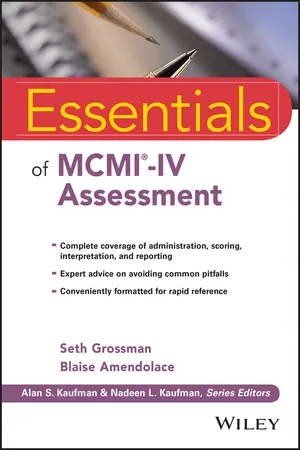
- English
- ePUB (mobile friendly)
- Available on iOS & Android
Essentials of MCMI-IV Assessment
About this book
Quickly acquire the knowledge and skills you need to administer, score, and interpret the MCMI ® -IV
Essentials of MCMI ® -IV Assessment is the definitive source of up-to-date, practical information for clinicians and students using the MCMI ® -IV inventory. Step-by-step guidelines walk you through the process of administering the assessment, with a profile and demonstration of the clinical process from administration to treatment. Expert discussion helps inform higher-quality therapeutic interventions. The link between assessment and intervention is emphasized throughout, as well as coverage of relevant populations and clinical applications, to provide a well-rounded understanding while illuminating the uses of the MCMI ® -IV.
This book provides instruction and clarification from the foremost experts to help you achieve better outcomes for your clients.
- Follow step-by-step guidelines for administering the MCMI ® -IV
- Recognize the connection between data and intervention
- Improve quality and accuracy of therapeutic applications
- Gain a more practical understanding of the MCMI ® -IV assessment process
The MCMI ® -IV assesses a wide range of information related to a client's personality, emotional adjustment, test-taking approach, and other critical information. Interpretation and reporting serve as a basis from which therapeutic interventions are designed, so quality and accuracy is of utmost importance every step of the way. Essentials of MCMI ® -IV Assessment is the most authoritative, up-to-date resource in the field, and a must-have reference for anyone who uses the test.
Frequently asked questions
- Essential is ideal for learners and professionals who enjoy exploring a wide range of subjects. Access the Essential Library with 800,000+ trusted titles and best-sellers across business, personal growth, and the humanities. Includes unlimited reading time and Standard Read Aloud voice.
- Complete: Perfect for advanced learners and researchers needing full, unrestricted access. Unlock 1.4M+ books across hundreds of subjects, including academic and specialized titles. The Complete Plan also includes advanced features like Premium Read Aloud and Research Assistant.
Please note we cannot support devices running on iOS 13 and Android 7 or earlier. Learn more about using the app.
Information
One
HISTORY AND DEVELOPMENT OF THE MCMI® THROUGH MCMI®-IV
Table of contents
- Cover
- Table of Contents
- Title Page
- Copyright
- List of Figures
- List of Tables
- Series Preface
- Chapter One: History and Development of the MCMI® Through MCMI®-IV
- Chapter Two: MCMI®-IV and Millon Evolutionary Theory
- Chapter Three: Administration and Scoring
- Chapter Four: Sections and Scales
- Chapter Five: Interpretive Principles
- Chapter Six: Therapeutic Alliance Building
- Chapter Seven: Strengths and Weaknesses of the MCMI®-IV
- Chapter Eight: Clinical Applications of the Millon Inventories
- Chapter Nine: Illustrative Case Reports
- References
- About the Authors
- Index
- End User License Agreement